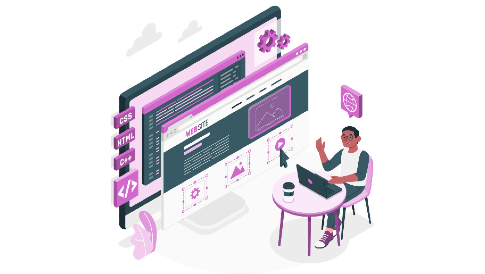Why SEO-Optimized Web Design Is Vital for Service-Based Brands
Search engine optimization remains a huge necessity for every business. Even with AI hogging the spotlight, online users continue to search for solutions on search engines. As long as users are searching, there will be a need for SEO.
Most service-based businesses rely on these solution-finding online searches by their target audience. That’s why SEO is even more crucial for those types of brands. Moreover, SaaS brands must rely entirely on their ability to rank in the search engine results page (SERP).
For these reasons, you need to evaluate your brand’s website and how its ranking ability could be affected. Let’s explore that reasoning now.
Why SEO-Friendly Design Matters
SEO-optimized web design combines technical, content, and user-experience elements to make a website search engine-friendly and appealing to potential clients. For service brands, like law firms or health providers, online discoverability plays a major part in acquiring new clients. Most consumers today look online for local service providers. Ranking on the first page of search results often determines whether you gain or lose a customer.

For example, a lawyer might consider investing in digital marketing for law firms to optimize their website. This ensures their law firm’s website ranks well on the SERP, making it easy for prospective clients to find them.
EEAT in SEO-Optimized Web Design
“EEAT” stands for Experience, Expertise, Authority, and Trustworthiness. It’s often the guiding acronym all SEO specialists use to govern their actions related to growing results for their brands. For service-based businesses, many customers will discover and learn about them online, so understanding and implementing EEAT is essential. Let’s look at each component of EEAT a little bit more:
Experience is about how directly involved or familiar the content creator is with the topic. Service businesses can show their experience by featuring testimonials or highlighting case studies. In a nutshell, experience is anything that shows a brand has successfully served others in the past.
Expertise focuses on the qualifications or specialized knowledge of the person or entity creating content. It also means demonstrating a brand’s knowledge and capability on a given subject (i.e., the service they offer). Businesses usually exhibit their know-how through written media or video to prove their expertise to their audience.
Authority involves building a reputation as a leading service provider. This becomes apparent by the amount of backlinks pointing to the company’s site from other websites. A website with a strong backlink profile indicates that other entities recognize and respect the material the brand is publishing.
Trustworthiness is essential for gaining and converting leads. Trust can be built through clear contact information, customer reviews, secure HTTPS encryption, and transparent business practices. For instance, including an address and phone number, being super clear about pricing, and showcasing security features help establish trust.
Core Elements of SEO-Optimized Web Design
The true list of SEO impactors is practically endless and largely hidden. Search engines, like Google, aren’t too keen on revealing how much weight they place on specific ranking factors. However, they do broadly explain what they prioritize.
1. Mobile Responsiveness
One of the most crucial elements is mobile responsiveness. Google prioritizes mobile-first indexing, primarily using the mobile version of a website for ranking. For service-based businesses, it’s essential to have a mobile-responsive design that works well across different devices. This is especially true with more consumers using mobile phones to search for local services. A mobile-optimized design reduces bounce rates and helps keep users engaged, which contributes to stronger SERP rankings.
2. Page Load Speed
The page load speed of your website is significant. Ideally, a page shouldn’t take more than three seconds to load. Any longer than that can cause people to get frustrated and bounce from the site. Search engines detecting longer loading times will anticipate user frustration and deprioritize ranking your pages. A simple solution for this is reducing the amount of page elements on your website to help it load faster.
3. User-Friendly Navigation
User-friendly navigation is a key component of effective SEO-optimized web design. A site should be intuitive, making it easy for visitors to find information quickly without confusion. Clear navigation, organized menus, and an easy-to-follow site structure improve the overall user experience, encouraging visitors to stay longer. Google considers this increased “dwell time” when determining how well a website should rank.
4. Schema Markup
Implementing schema markup on your site is one of the most important technical exercises you can do for your website. Unfortunately, it’s also one of the most overlooked actions because it’s not readily apparent to users. However, schema markup is what search engines will refer to for understanding key pieces of information about your website.
Schema markup is a form of structured data that helps search engines understand the content and context of a webpage. Well-implemented schema markup often results in rich snippets appearing at the top of search results, improving visibility and click-through rates. For service-based businesses, schema can display essential information — such as services, pricing, and customer reviews — directly in search results. This might give a noticeable edge over competitors, many of whom are likely neglecting it.
Last Thoughts on SEO for Service-Based Businesses
The biggest takeaway is to focus your website pages and content on the user first, not search engines. While you need to satisfy search engines at a technical level, answering consumer questions will make ranking easier.
Concentrate on making your content unique. Express your brand’s industry expertise on your website the same way you would in any casual conversation. If your brand holds to a certain viewpoint, make sure that comes through on your website. Having a unique take on your industry and service gives search engines a reason to present your information over others. Now you’re ready to go start driving traffic.




Leave a Reply